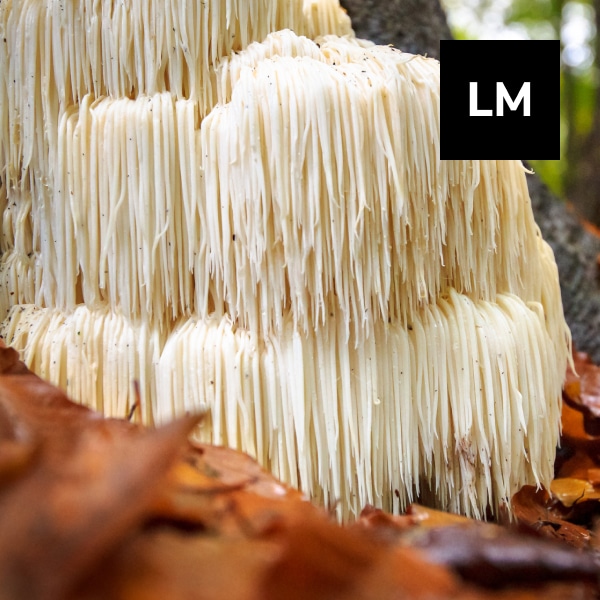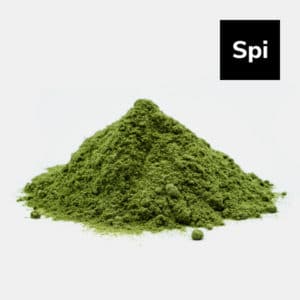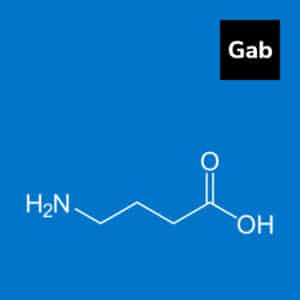Overview
Lion’s Mane (Hericium erinaceus) gained its name from its white and shaggy appearance, which resembles a lion’s mane. It contains a lot of vitamins, beta-glucan polysaccharides, potassium, and zinc. It has long been used in Asia for a variety of health benefits, and it is today a popular stand-alone product and ingredient in mushroom blends all over the world.
Key Benefits
- Supports the brain and cognitive functions.
- Helps with concentration
- Helps with nervous system health
- Boosts immunity
- Promotes a positive mood
- May benefit the stomach lining.
History of Usage
Lion’s mane has been used by people all over the world for ages. It is derived from the root and stem of the Malayan Lion’s Mane plant, and its use dates back to 1000 B.C. in ancient Egypt. This herb is widely used in several nations, including China and India. Buddhist monks are known to have used Lion’s Mane to concentrate while meditating.
Biochemistry
Lion’s Mane (Hericum Erinaceus) includes a variety of phytochemicals, including polysaccharides like B-glucan, hericenones, and erinacines. It boosts immune function by stimulating cell-mediated and humoral immunity, macrophage phagocytosis, and NK cell activity. Furthermore, it was discovered to increase the secretion of cellular signaling pathways in the intestine. These findings have led experts to hypothesize that Lion Mane’s immunomodulatory effects are most likely due to the excellent modulation of intestinal mucosal immune activity.
These extracts have also been shown to have anti-inflammatory and antidepressant effects in an inflammation-induced mouse model of depression.
Recent Trends
China has emerged as the world’s leading producer of mushrooms. The global lion’s mane mushroom market is expected to increase significantly as people become more aware of mushrooms’ medicinal benefits.
Lion’s mane extract is available in the form of powders, teas, and elixirs in nutritional supplements. It’s best when dried and paired with Lingzhi mushrooms.
Brain tonics containing the bioactive chemicals amyloban and hericenones found in Lion’s Mane are also gaining popularity.
Precautions
- Lion’s Mane mushroom should not be consumed by pregnant or breastfeeding women.
- Lion’s Mane may slow blood clotting, thus patients should discontinue it at least two weeks before surgery.
- Lion’s Mane may help to reduce blood sugar levels. If you have diabetes, keep an eye out for hypoglycemia.
References
- Mayumi Nagano et al. “Reduction of Depression and Anxiety by 4 Weeks Hericium erinaceus Intake,” Biomedical Research 31, no. 4 (2010): 231-7.https://www.ncbi.nlm.nih.gov/pmc/articles/PMC5987239.
- I-Chen Li et al. “Neurohealth Properties of Hericium erinaceus Mycelia Enriched with Erinacines,” Behavioural Neurology, May 21, 2018.https://www.ncbi.nlm.nih.gov/pmc/articles/PMC5987239.
- Koichiro Mori et al., “Improving Effects of the Mushroom Yamabushitake (Hericium erinaceus) on Mild Cognitive Impairment: A Double‐Blind Placebo‐Controlled Clinical Trial,” Phytotherapy Research 23, 3 (2008): 367-372, https://onlinelibrary.wiley.com/doi/abs/10.1002/ptr.2634.
- Xiaotong Sheng et al. “Immunomodulatory Effects of Hericium erinaceus Derived Polysaccharides are Mediated by Intestinal Immunology,” Food & function 8, no. 3 (2017): 1020-1027, https://pubmed.ncbi.nlm.nih.gov/28266682.
- Sheng X, Yan J, Meng Y, Kang Y, Han Z, Tai G, Zhou Y, Cheng H. Immunomodulatory effects of Hericium erinaceus derived polysaccharides are mediated by intestinal immunology. Food Funct. 2017 Mar 22;8(3):1020-1027. doi: 10.1039/c7fo00071e. PMID: 28266682.
- Diling C, Chaoqun Z, Jian Y, Jian L, Jiyan S, Yizhen X, Guoxiao L. Immunomodulatory Activities of a Fungal Protein Extracted from Hericium erinaceus through Regulating the Gut Microbiota. Front Immunol. 2017 Jun 12;8:666. doi: 10.3389/fimmu.2017.00666. PMID: 28713364; PMCID: PMC5492111.
- Yao W, Zhang JC, Dong C, Zhuang C, Hirota S, Inanaga K, Hashimoto K. Effects of amycenone on serum levels of tumor necrosis factor-α, interleukin-10, and depression-like behavior in mice after lipopolysaccharide administration. Pharmacol Biochem Behav. 2015 Sep;136:7-12. doi: 10.1016/j.pbb.2015.06.012. Epub 2015 Jul 4. PMID: 26150007.




